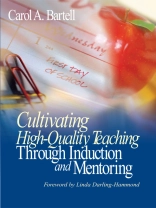Develop induction programs that focus on improved practice rather than just survival skills!
‘All beginning teachers face significant challenges during their induction into the teaching profession. This book provides a cogent, thoughtful, and practical guide to working in the areas of teacher induction and mentoring, and is a must read for academics, program developers, and practitioners alike.’
Sandra Odell, Professor
University of Nevada, Las Vegas
‘Bartell argues that induction is about more than retaining teachers. It is about helping all teachers become more professional and better at what they do . . . and, most important, it is about improving student learning.’
From the Foreword by Linda Darling-Hammond
Charles E. Ducommun, Professor of Education
Stanford University
The first few years of teaching are the most challenging. During these years, teachers are most likely to become discouraged and disillusioned. Yet these early years are also the time when teachers establish practices that last throughout their careers.
Cultivating High-Quality Teaching Through Induction and Mentoring focuses on new teachers′ needs while emphasizing high-quality teaching through the use of standards-based teaching, teacher assessments, and reflective practice. Through extensive research, Carol Bartell has identified the critical elements in shaping induction policies that lead to teacher retention and improved student achievement. Because teachers begin with different levels of preparation, Bartell addresses how to adjust programs to meet differing needs in a variety of school contexts.
Bridging the gap between knowledge and practice, this handbook includes:
- A description of the challenges that new teachers face
- The key elements of an effective induction plan
- The role of mentoring in a successful induction program
- Information on induction in the most challenging setting-urban schools
- Models and approaches to assessment during the induction period
Throughout, this book emphasizes a developmental approach to encouraging teachers to a higher level of practice that extends beyond the usual survival skills. Don′t just prepare teachers to teach, prepare them to teach better!
Tabela de Conteúdo
Foreword – Linda Darling-Hammond
Preface
1. The Challenges Facing Beginning Teachers
2. Understanding the Stages of Teacher Development
3. The Characteristics of Effective Induction Programs
4. Mentoring Strategies and Best Practices
5. Urban Schools and Induction
6. Standards-Based Teaching and Reflective Practice
7. Teacher Assessment
8. Developing Induction Policies to Shape Induction Practices
References
Index
Sobre o autor
Carol A. Bartell has been interested in teacher induction since 1988, when she first became involved with what was then the California New Teacher Project, a pilot project with fifteen districts in California. Her role was first as a faculty member at the University of Pacific in Stockton, and shortly after as a staff member at the California Commission on Teacher Credentialing, and finally, as a member of the Commission representing the independent California Colleges and Universities in her role as Dean of the School of Education at California Lutheran University. Her interest in assisting teachers in urban schools led her to accept, beginning in the fall of 2003, the position of Dean of the Charter College of Education at California State University, Los Angeles. Dr. Bartell has worked on a number of efforts related to teacher induc-tion. She served as project officer for the evaluation of the California induc-tion programs, led the initial state task force that developed the California Standards for the Teaching Profession, and led the development of the peer review process for the Beginning Teacher Support and Assessment Program. She has served on a number of national task forces and Commissions related to induction, including the National Commission on Professional Development and Support of Novice Teachers sponsored by the Association of Teacher Educators and Kappa Delta Pi, and the Interstate New Teacher Assessment and Support Consortium (INTASC). Before Dr. Bartell entered the state policy and the higher education arena, she was a teacher. Her P-12 teaching career spans eleven years in five different states in urban, rural, and suburban settings. She remembers what it was like to begin anew as a novice in a different teaching context. She still enjoys getting into the classroom, when her schedule permits, to work with university students preparing for that very important work in schools.











